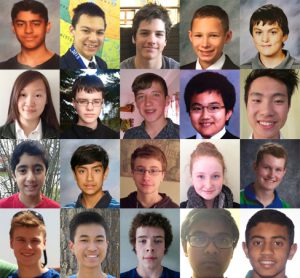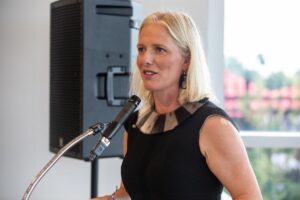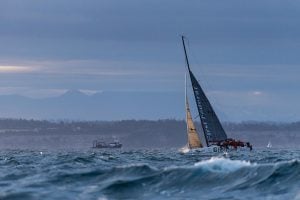
Kids
Meet the 2015 Canadian Geographic Challenge participants
The Canadian Geographic Challenge, now in its 20th anniversary year, will bring 20 young…
- 1691 words
- 7 minutes
People & Culture

Tori Baird is changing the narrative on how women are perceived when they take their canoes on the water. An avid canoeist, in 2020 Baird founded Paddle Like A Girl — a canoeing workshop for woman that has helped transform the narrative on female canoers and empower them to get out on the water. With the confidence she instills during these workshops located on her property on the Magnetawan River, her goal is “to help more women of all shapes, ages, and backgrounds discover the peace and beauty that mother nature has to offer.”
Canadian Geographic spoke with Tori Baird about the many qualities canoeing brings, such as enjoying nature’s beauty, and finding your inner strength.
On how she got into canoeing
I didn’t grow up in the outdoors at all. I think I went on one trip to the Algonquin with my mom and sister when I was younger. Other than that, I was not a canoeist or a camper by any means. I got into canoeing because of my now-husband. He was an avid canoeist for a few years before we had met. He introduced me to canoeing, taking me on a bunch of weekend canoe trips throughout Ontario. We were doing a lot of whitewater paddling. So, a couple of interesting experiences right off the bat! But instantly I fell in love with it and the feeling of being outside and camping — and all the adrenaline and excitement that comes with it.
On how her son inspired the creation of Paddle Like A Girl
I had my son in the summer of 2018. We noticed that he was falling behind developmentally in December, January of that year. So the whole year was consumed with testing for him because he was just gradually becoming more and more behind. It was an extremely stressful time in my life. Ten months into testing, my friend Cobi invited me out on this solo trip.
During the trip, I was thinking: I can still go on these types of trips; they may just look different. I do still have the ability to get out into nature, and getting out there was just so stress-relieving for me. Being in nature, getting the exercise and getting out into the backcountry requires so much skill and experience — it was empowering to me. It builds a lot of confidence, and it also just reminds me that I can handle whatever adversities may come.
Once I completed that trip with Cobi, I felt so empowered that I felt like, “oh my gosh, more women need to experience this,” because we are often plagued with a ton of responsibilities: working full time, being the caregivers, taking care of the home, the kids, and everyone in the family. Just so many responsibilities. It’s so hard to get out into nature and hit the reset button and have that time to yourself. The confidence that comes with completing a trip to the backcountry — and we’re talking having your canoe and all your gear, knowing how to start a fire, or how to set up your tent. It instills so much empowerment that I wanted other women to experience that for themselves.
On why women need to see past these barriers
Oftentimes, women come up here and see me lift up the canoe, and they’re like, “oh, I can’t do that, I’m not going to be able to do that.” They come up here, having been on a backcountry canoe trip with their husband, and they’re like “my husband always carries the canoe, so that’s never something I’ve ever tried,” or, “I’m too afraid.” The biggest barrier is lifting the canoe over their head and then carrying it because we do a short portage here too. They all want to try carrying the canoe; it’s one of the things that they’re most excited about — which, I mean, on a canoe trip nobody wants to have to carry the canoe. The point in canoeing is to be sitting in and paddling, but [having to carry the canoe is] the biggest barrier between getting from one lake to the next lake and getting deeper into that country. It is a skill that you have to have. But they’re all just so excited to get that canoe over their head, and they’re so proud of themselves because they didn’t think they were strong enough — and here they are carrying the canoe for half a kilometre!

On advice for beginners
My advice would be to start small — don’t take on anything that’s out of your level of experience or skillset because, of course, it can be very dangerous. You can drown if you’re paddling in cold frigid water. There’s the risk of hypothermia and things like that. Make sure you’re in a safe environment with skilled people or a skilled person. Just start small and gradually build as you gain confidence. I think many people underestimate the skill that goes into canoeing — especially just trying to keep a canoe going straight can be challenging. As I said, I started with whitewater paddling, but my husband is extremely experienced and skilled, so he knew what he was doing. It wasn’t taking a huge risk for me because he knew the ins and outs of it, and he knew what we could handle together as a team. Start with someone who has a little bit of knowledge and read some books about it. Go on Google and start researching how to paddle the canoe and trim the canoe because these are all important things to know.
On what’s next for her
For Paddle Like A Girl, I have so many plans. Last year I ran four workshops. This year I’m offering last year’s participants to come on an actual backcountry canoe trip: I’ll take all the skills you learned last year, and now we can head out to the backcountry and put those skills to use. We’re going to make that backcountry canoe trip in September, if everything is okay, you know, with COVID and things like that. So that’s the immediate plan going forward.
I am also pregnant, so I’m having my second child in August. It’s going to slow things down this year because, in August, I’m going to be very pregnant, so I don’t know how many workshops I’m going to be able to do! But I’m hoping to just kind of jump right back on it after I have the baby. I’m going to be running the workshops right up until the end of July. I want to be able to still offer these this year, and have people come up and, and get out there.
Are you passionate about Canadian geography?
You can support Canadian Geographic in 3 ways:

Kids
The Canadian Geographic Challenge, now in its 20th anniversary year, will bring 20 young…

People & Culture
The story of how a critically endangered Indigenous language can be saved

People & Culture
A century after the first woman was elected to the Canadian Parliament, one of the most prominent figures in present-day politics shares her thoughts on how to amplify diverse voices in the Commons

Exploration
This motor-free ocean race — with vessels ranging from paddleboards to pedal-assist sailboats — is less about how fast you can go and more about whether you get there at all